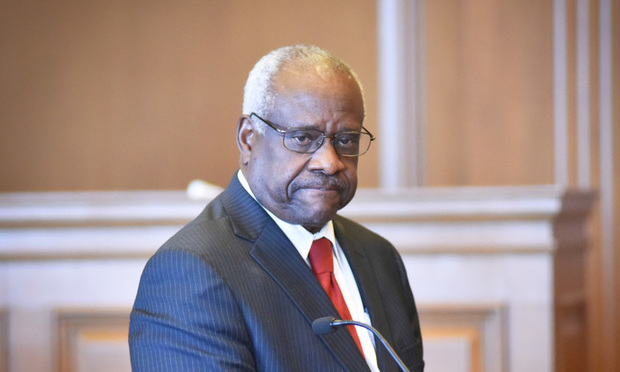Justice Thomas Ventures Beyond Elite Schools to Fill Clerkship Posts
In a system where justices pull heavily from their own alma maters and a handful of other top schools, Justice Clarence Thomas casts the widest net.
December 11, 2017 at 09:00 PM
11 minute read

Justice Clarence Thomas has earned a reputation as a frequent dissenter during his 26 years on the U.S. Supreme Court bench, and when it comes to the clerks he hires, he also strays from the pack.
In a system where justices pull heavily from their own alma maters and a handful of other top schools to fill the coveted slots, Thomas casts the widest net.
He has hired from 23 different law schools since 2005, with one-third of his clerks coming from schools outside the Top 10 on the U.S. News and World Report rankings. The approach, he has said, enables him to find excellence “from all over.”
➤➤ INFOGRAPHIC: Click here to view the Top 15 law schools for Supreme Court clerk placements and sort by justice to see who's hiring from which law schools.
His clerk class in 2008 generated quite the internet buzz that year. Not one of the four bright young attorneys the justice chose as clerks graduated from an elite law school. Instead, they hailed from George Washington University Law School; George Mason University School of Law; Creighton University School of Law; and Rutgers School of Law-Camden, none of which land in U.S. News Top 20 law schools. (Creighton, in Omaha, Nebraska, came in at No. 120 in this year's rankings.)
 By contrast, Stephen Breyer, Ruth Bader Ginsburg, Elena Kagan and Anthony Kennedy have hired 10 percent or fewer of their clerks from law schools outside the U.S. News Top 10 since 2005. The late Antonin Scalia hired just a single graduate from those nonelite schools during that period—the interloper coming from George Washington University Law School.
By contrast, Stephen Breyer, Ruth Bader Ginsburg, Elena Kagan and Anthony Kennedy have hired 10 percent or fewer of their clerks from law schools outside the U.S. News Top 10 since 2005. The late Antonin Scalia hired just a single graduate from those nonelite schools during that period—the interloper coming from George Washington University Law School.
Over the past decade, Harvard and Yale have increased their dominance with graduates of the two law schools accounting for half of all Supreme Court law clerks.
“Some of the justices don't interview or even consider students from other schools or don't take those students seriously even when they come from the same feeder judges, and have perfect credentials,” said Micah Schwartzman, who heads the clerkship committee for the No. 8 ranked University of Virginia School of Law.
The always-direct Scalia explained his preference for clerks from only the most prestigious law schools during a 2009 talk at American University Washington College of Law. “By and large, I'm going to be picking from the law schools that basically are the hardest to get into …,” Scalia said. “If they come in the best and the brightest, they're probably going to leave the best and the brightest, OK?”
But Thomas, ideologically aligned with Scalia, gave a very different perspective on clerk hiring while speaking to students at the University of Florida Levin College of Law in 2012.
“There are smart kids every place,” he said. “They are male, they are female, they are black, they're white, they're from the West, they're from the South, they're from public schools, they're from public universities, they're from poor families, they're from sharecroppers, they're from all over.” He added, “I look at the kid who shows up. Is this a kid that could work for me?”
Thomas's former clerks say they appreciate his wider search from law schools that aren't traditional Supreme Court feeders.
“He believes you can find excellence in all sorts of different places,” said Claire Evans, a 2008 Thomas clerk who graduated from Rutgers School of Law-Camden. “To me, it's a credit to him that he's willing to look anywhere and everywhere, and to consider my application.”
➤➤ SCOTUS Clerks: Who Gets the Golden Ticket? Join reporter Tony Mauro and Hogan Lovells partner Neal Katyal on Thursday, Dec. 14, for a conference call about clerk hiring and diversity. Click here to register.

Justice
In a system where justices pull heavily from their own alma maters and a handful of other top schools to fill the coveted slots, Thomas casts the widest net.
He has hired from 23 different law schools since 2005, with one-third of his clerks coming from schools outside the Top 10 on the U.S. News and World Report rankings. The approach, he has said, enables him to find excellence “from all over.”
➤➤ INFOGRAPHIC: Click here to view the Top 15 law schools for Supreme Court clerk placements and sort by justice to see who's hiring from which law schools.
His clerk class in 2008 generated quite the internet buzz that year. Not one of the four bright young attorneys the justice chose as clerks graduated from an elite law school. Instead, they hailed from
 By contrast, Stephen Breyer,
By contrast, Stephen Breyer,
Over the past decade, Harvard and Yale have increased their dominance with graduates of the two law schools accounting for half of all Supreme Court law clerks.
“Some of the justices don't interview or even consider students from other schools or don't take those students seriously even when they come from the same feeder judges, and have perfect credentials,” said Micah Schwartzman, who heads the clerkship committee for the No. 8 ranked
The always-direct Scalia explained his preference for clerks from only the most prestigious law schools during a 2009 talk at American University Washington College of Law. “By and large, I'm going to be picking from the law schools that basically are the hardest to get into …,” Scalia said. “If they come in the best and the brightest, they're probably going to leave the best and the brightest, OK?”
But Thomas, ideologically aligned with Scalia, gave a very different perspective on clerk hiring while speaking to students at the
“There are smart kids every place,” he said. “They are male, they are female, they are black, they're white, they're from the West, they're from the South, they're from public schools, they're from public universities, they're from poor families, they're from sharecroppers, they're from all over.” He added, “I look at the kid who shows up. Is this a kid that could work for me?”
Thomas's former clerks say they appreciate his wider search from law schools that aren't traditional Supreme Court feeders.
“He believes you can find excellence in all sorts of different places,” said Claire Evans, a 2008 Thomas clerk who graduated from Rutgers School of Law-Camden. “To me, it's a credit to him that he's willing to look anywhere and everywhere, and to consider my application.”
➤➤ SCOTUS Clerks: Who Gets the Golden Ticket? Join reporter Tony Mauro and
This content has been archived. It is available through our partners, LexisNexis® and Bloomberg Law.
To view this content, please continue to their sites.
Not a Lexis Subscriber?
Subscribe Now
Not a Bloomberg Law Subscriber?
Subscribe Now
NOT FOR REPRINT
© 2025 ALM Global, LLC, All Rights Reserved. Request academic re-use from www.copyright.com. All other uses, submit a request to [email protected]. For more information visit Asset & Logo Licensing.
You Might Like
View All
Trump RTO Mandates Won’t Disrupt Big Law Policies—But Client Expectations Might
6 minute read
Trump's RTO Mandate May Have Some Gov't Lawyers Polishing Their Resumes
5 minute read
Trump Administration Faces Legal Challenge Over EO Impacting Federal Workers
3 minute readTrending Stories
Who Got The Work
J. Brugh Lower of Gibbons has entered an appearance for industrial equipment supplier Devco Corporation in a pending trademark infringement lawsuit. The suit, accusing the defendant of selling knock-off Graco products, was filed Dec. 18 in New Jersey District Court by Rivkin Radler on behalf of Graco Inc. and Graco Minnesota. The case, assigned to U.S. District Judge Zahid N. Quraishi, is 3:24-cv-11294, Graco Inc. et al v. Devco Corporation.
Who Got The Work
Rebecca Maller-Stein and Kent A. Yalowitz of Arnold & Porter Kaye Scholer have entered their appearances for Hanaco Venture Capital and its executives, Lior Prosor and David Frankel, in a pending securities lawsuit. The action, filed on Dec. 24 in New York Southern District Court by Zell, Aron & Co. on behalf of Goldeneye Advisors, accuses the defendants of negligently and fraudulently managing the plaintiff's $1 million investment. The case, assigned to U.S. District Judge Vernon S. Broderick, is 1:24-cv-09918, Goldeneye Advisors, LLC v. Hanaco Venture Capital, Ltd. et al.
Who Got The Work
Attorneys from A&O Shearman has stepped in as defense counsel for Toronto-Dominion Bank and other defendants in a pending securities class action. The suit, filed Dec. 11 in New York Southern District Court by Bleichmar Fonti & Auld, accuses the defendants of concealing the bank's 'pervasive' deficiencies in regards to its compliance with the Bank Secrecy Act and the quality of its anti-money laundering controls. The case, assigned to U.S. District Judge Arun Subramanian, is 1:24-cv-09445, Gonzalez v. The Toronto-Dominion Bank et al.
Who Got The Work
Crown Castle International, a Pennsylvania company providing shared communications infrastructure, has turned to Luke D. Wolf of Gordon Rees Scully Mansukhani to fend off a pending breach-of-contract lawsuit. The court action, filed Nov. 25 in Michigan Eastern District Court by Hooper Hathaway PC on behalf of The Town Residences LLC, accuses Crown Castle of failing to transfer approximately $30,000 in utility payments from T-Mobile in breach of a roof-top lease and assignment agreement. The case, assigned to U.S. District Judge Susan K. Declercq, is 2:24-cv-13131, The Town Residences LLC v. T-Mobile US, Inc. et al.
Who Got The Work
Wilfred P. Coronato and Daniel M. Schwartz of McCarter & English have stepped in as defense counsel to Electrolux Home Products Inc. in a pending product liability lawsuit. The court action, filed Nov. 26 in New York Eastern District Court by Poulos Lopiccolo PC and Nagel Rice LLP on behalf of David Stern, alleges that the defendant's refrigerators’ drawers and shelving repeatedly break and fall apart within months after purchase. The case, assigned to U.S. District Judge Joan M. Azrack, is 2:24-cv-08204, Stern v. Electrolux Home Products, Inc.
Featured Firms
Law Offices of Gary Martin Hays & Associates, P.C.
(470) 294-1674
Law Offices of Mark E. Salomone
(857) 444-6468
Smith & Hassler
(713) 739-1250









